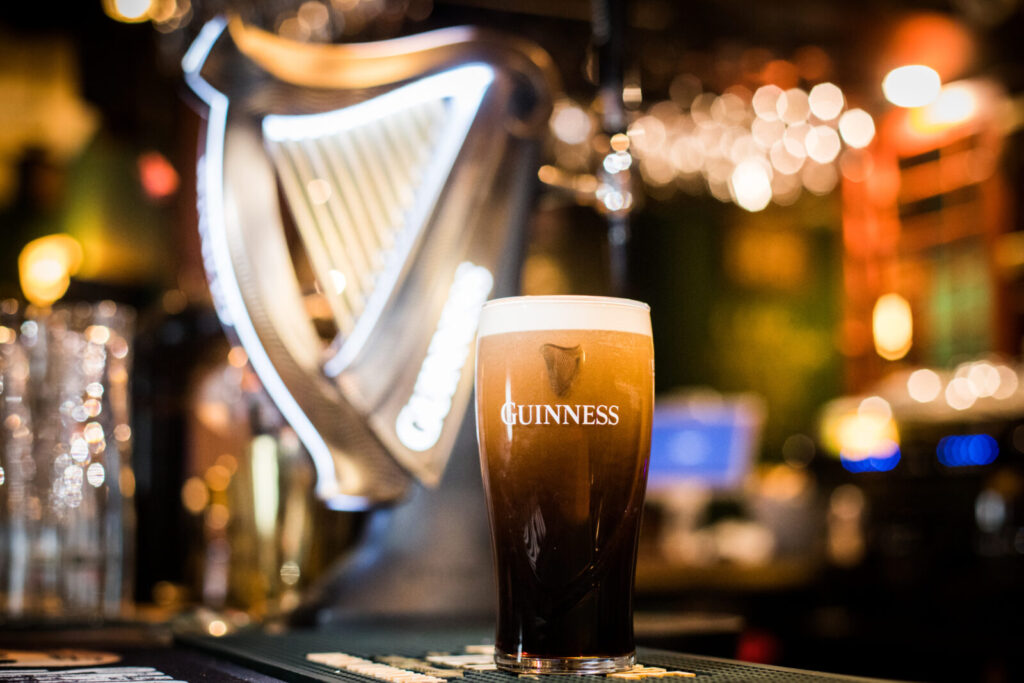Brief • 3 min Read
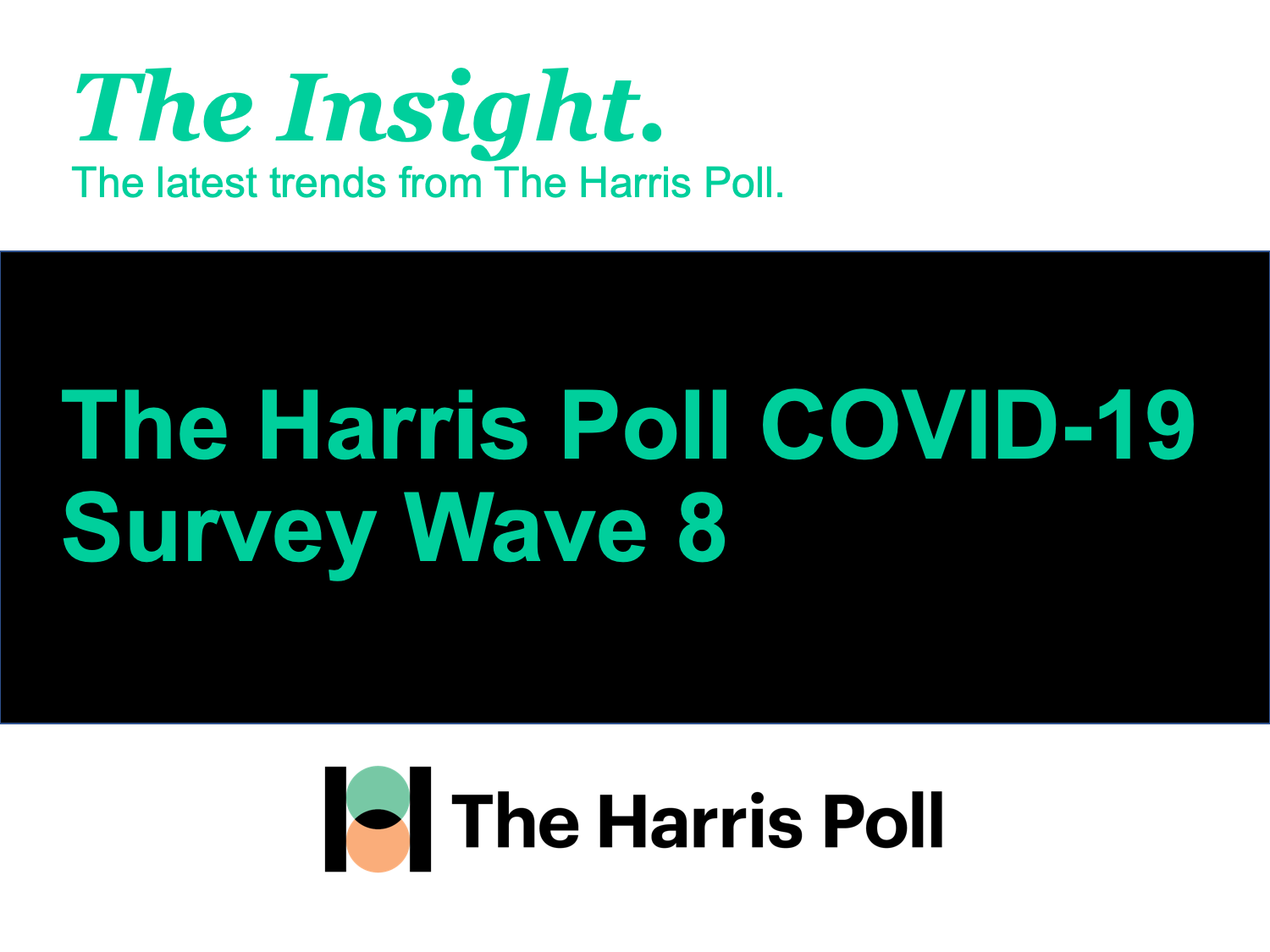
Good morning. In Wave 8 of The Harris Poll COVID-19 Tracker fielded April 18-20, 2020, we see America’s enduring patience to shelter in place; what business must do to protect consumers (according to consumers); rising Cv-related discrimination in America; uncertainty with voting and going to baseball games, but being more than ok with tech tracing.
Our team has curated key insights to help you navigate the coronavirus. Full survey results and business implications can be found at The Harris Poll COVID-19 Portal. We will continue to actively field and provide insights on a regular cadence to keep you informed of the shifts in sentiment and behaviors as the news and guidelines evolve.
America Stays Patient
Americans are siding with governors in saying their state’s social distancing restrictions are striking the right balance with just over 1 in 10 saying they are too restrictive. And there is strong support across the political divide to keep them in place for now:
- 7 in 10 Americans (69%) say their state is striking the right balance while (17%) say they are not restrictive enough and only (14%) too restrictive.
- Strong majorities of Republicans (70%), Democrats (68%), and Independents (68%) say states have the right balance of restrictions.
- In our polling featured on NBC News, over two-thirds of voters (67%) said they expect it to be at least a month before Americans should start returning to work and life as normal.
- Meanwhile, financial stress is building for nearly 9 in 10 Americans as we discussed with CNBC, and the Harvard CAPS /Harris Poll found that economy and jobs are now the second most important issue (41% of voters) after the management of the coronavirus crisis (63%).
Takeaway: Americans are optimistic about overcoming the virus and getting back to normal which is why they back the current lockdown in overwhelming numbers despite the growing economic pain. Go short on the economy but long on American resilience.
Every Business Is Now Like a Hospital
No one action will make Americans feel safer to fly on a plane, return to work, attend a sporting or large venue event, or eat out at a restaurant. But in a new Harris Poll business playbook for reopening there are tactics consumers say will make them feel more welcome and at ease:
- Eat alone together: Three-fourths (74%) of Americans miss dining at a restaurant/bar and patrons want back in but (62%) want restaurants configured for social distancing, and (56%) want maximum capacity limits to ensure 6-feet between diners.
- Practice haute hygiene: According to Eater, “You may be having dinner with a waiter wearing gloves…maybe a face mask, a dinner where the menu is disposable, where the tables, half of the tables in that restaurant no longer appear, where your temperature is checked before you walk into the establishment.” In fact, our poll found (45%) of Americans want temperature tests for restaurant staff and even a quarter want a no-beard policy for waiters and kitchen staff (22%).
- No more open floor plans: In order to feel safe returning to work (61%) want policies requiring employees to stay home if they feel sick, (48%) say no meetings larger than 10 people and (47%) say desks should be spaced 6-feet apart.
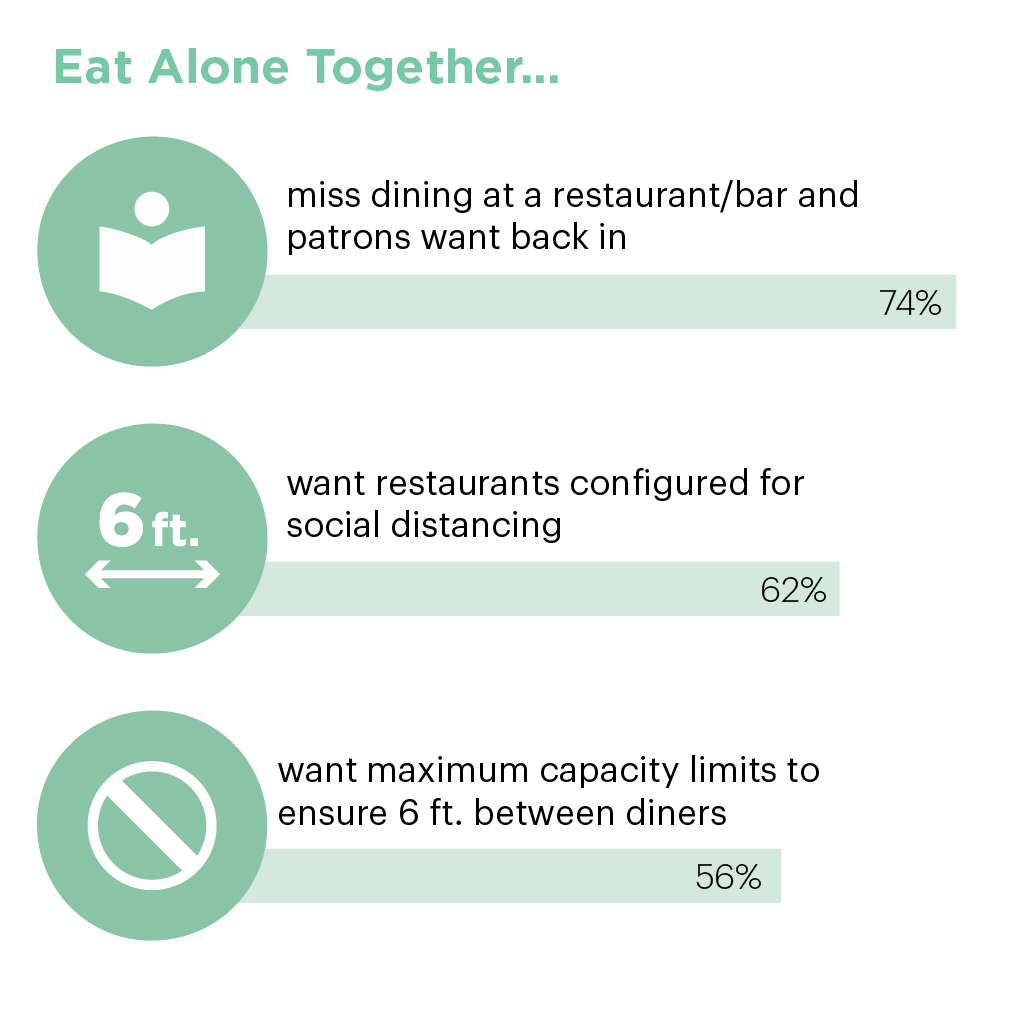
Takeaway: Farm to table thinking now applies to hygiene: Every company’s cleanliness must be ‘transparent and sourceable’. Expect consumers and employees to make demands on businesses which seem prudent to the former and excessive to the latter. And each must manage the tension in customer wants with conflicts in privacy, margins and worker rights.
We’re All In This Together… But Are We?
While the pandemic has led to countless numbers of uplifting stories, the story of Asian Americans being blamed for COVID-19 is not one of them.
- An Unacknowledged Problem: While the FBI has warned of potential surge in hate crimes against Asian Americans amid coronavirus, less than half of the public (45%) feel hate/discrimination has risen towards Asian Americans since the COVID-19 outbreak.
- Lack of Concern: Even more worrisome, 41% say they are not at all or not very concerned about this growing problem in our country as Asian Americans grapple with feeling like a person of suspicion in their own community and slurs they never expected.
- Behind the story: Our poll shows Americans report bi-partisan distrust of the Chinese Government and support The President’s tariffs, while 77% blame China for the virus.
- What does this mean? The CDC and DOJ worked to stop bias incidents and hate crimes following the SARS outbreak and the 9/11 terrorist attacks but The Center for Public Integrity and NBC reported Federal Agencies have done very little to address anti-Asian hate and this unacknowledged problem will likely continue to get worse until Federal Agencies have a plan to stop the anti-Asian hate, as reported by NBC.
Takeaway: We will be looking deeper into this divide in our nation as part of our #washthehate series in the COVID-19 Tracker.
All Hail Vote By Mail
Who wants to stand in line at the ballot box in November? Not many it seems. Voting-by-mail has broad and popular support for the upcoming election: Nearly three-fourths of Americans (73%), and a strong majority of both parties, approve of vote-by-mail in November’s presidential election.
- TechCrunch says vote-by-mail should be having its moment. Will it? Among those who disapprove of vote-by-mail (27%), (78%) say it is in fear of voter fraud, (57%) say issues with counting votes, (57%) say voting should be done in person, and (56%) are concerned with security.
- We wonder: Couldn’t the Census takers be mobilized to help ensure analog/mail voting?
- Local outreach matters too: In Austin, buses equipped with wifi are rolling out to neighborhoods with limited online access (see ingenious ways governments are enforcing social distancing around the world including “keep the distance of one alligator” in Florida).
Takeaway: That three-quarters of Americans are concerned with going to the polls five months from now gives an indication of trepidation of public places, portending a ‘Cruel Summer’ at least as far as mass gatherings go.
Will Sports Return at All?
As fans hope for some return of an NBA playoff, Stanley Cup and the start of MLB, Americans are unsure that sports will go on: one-third (34%) say sports leagues should cancel this season and wait until next season to resume, but there are other competing opinions:
- Supporting Dr. Fauci’s plan, 4 in 10 say they should either play the season without fans (21%), or restart the current season now and phase fans in later (20%). Only (15%) say they should restart the current season only when fans can attend.
- While more than 4 in 10 (45%) say they miss watching sports on TV and half (49%) miss attending sporting events in person, one-fifth of Americans (21%) say there is nothing that would make them feel safe to attend a sporting event again. In our polling for USA TODAY, only (6%) said they would go to a game as soon as allowed.
- What’s replacing sports? As we told The NY Post, lots and lots of new streaming. The NYT has a gameplan for what has to happen first for sports to come back. Meanwhile F1 to The Premiere League are turning to e-sports and giving players devices instead of cars and soccer balls.
- Our Athlete of The Week: This 99 year old UK vet raises over 23 million for the NHS
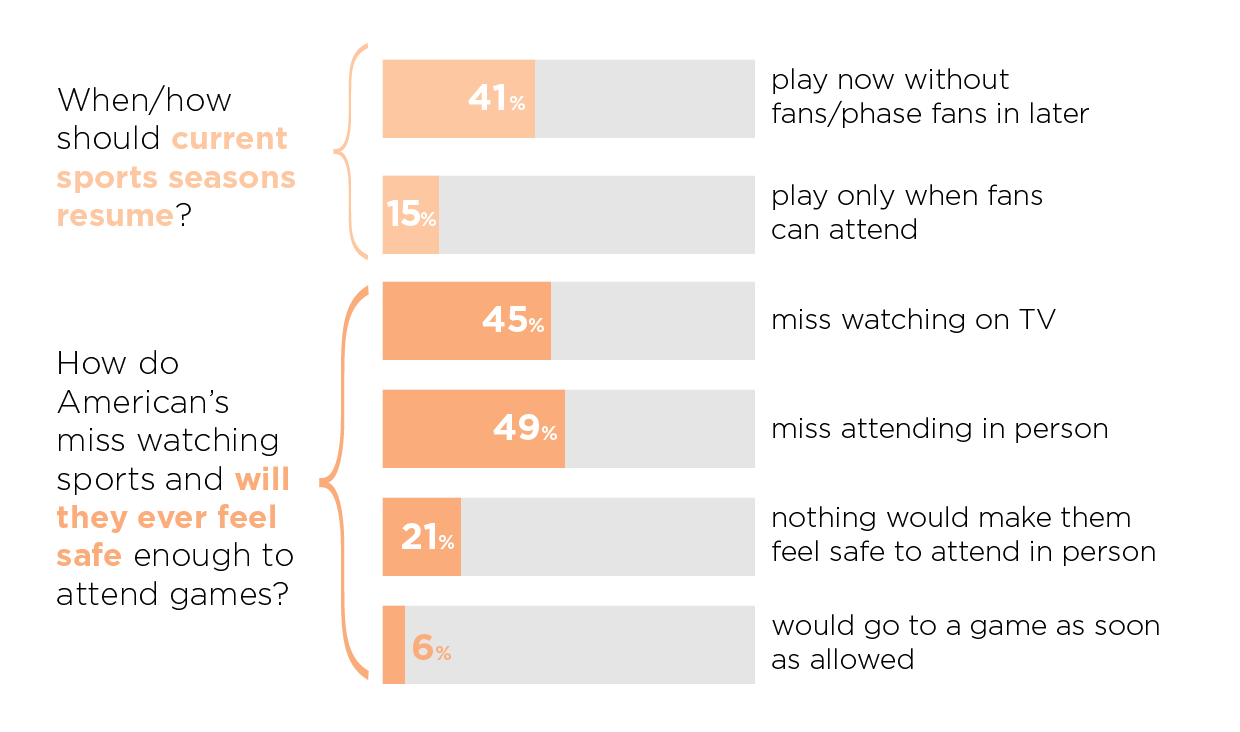
Takeaway: Americans are coming to grips about managing their expectations about hot dogs and a seventh-inning stretch. Meanwhile re-runs of historic sporting events like The Masters and NBA Finals are reaching record audiences. Sports programmer and historian might be a new post Cv19 occupation.
Big Tech and Pharma to The Rescue
Sometimes it takes a crisis to turn a black hat, white: A large majority (81%) of Americans approve of large tech companies helping to trace coronavirus cases they may have been exposed to.
- According to The Verge: Apple and Google are building a coronavirus tracking system for tracking the spread of the new coronavirus, allowing users to share data through Bluetooth and approved apps from health organizations.
- What a difference a pandemic makes: In our Axios-Harris Poll 100 2019 Corporate Reputation Rankings, some tech reputation rankings were battered while others are rising in American esteem: Samsung was ranked #7, Microsoft #9, and Sony #10.
- Even tech as an industry is rising during CV19: (38%) say their view of the industry has become more positive since the start of the outbreak, and (40%) of Americans say the tech industry should provide solutions during the outbreak.
- And the pharmaceutical industry stands to play a big role also: As Fortune notes, “as much as the pandemic has devastated many industries, it has offered Big Pharma a chance to shine as never before, winning back the trust of a public infuriated with years of soaring drug prices. Will they seize the moment? Without a safe and widely disseminated vaccine to confer immunity on a huge swath of the population, it’s hard to imagine life returning to something resembling ‘normal.’” In our tracking, over half (55%) say pharma should be providing solutions during the outbreak, and 4 in 10 (37%) say their view has become more positive.
Takeaway: American compliance to share their data is a boon to public health and re-opening the economy safely. Once testing scales, information sharing will be crucial and watch for tech to be a big part of the solution in socializing ‘safe spots’ for consumerism and other economic and social activities.
Curiously, Americans Spurn Lessons Learned
We spent this whole newsletter telling you how prudent and careful Americans are being…and then there’s this: Despite the decrease in American’s fear of dying from COVID-19 (44%, down from 56% last week) Americans are not thinking about proper precautions against the flu next season.
- Herd Immunity? While 62% said a C19 vaccine would be necessary to resume normal activities like flying, going to the gym, sporting events, etc., (57% to return to work), less than half (44%) say they are very likely to get a COVID-19 vaccination as soon as it becomes available.
- Only (53%) of Americans say they received their flu shot during the 2019-2020 season and only (50%) plan to get their flu shot for the upcoming 2020-2021 season. That’s only a four-point uptick in concern, supporting assertions in an excellent FT essay that humans are poor at assessing risk.
- For an in-depth read of quantifiable human folly, see HBR Predictable Surprises: The Disasters You Should Have Seen Coming.
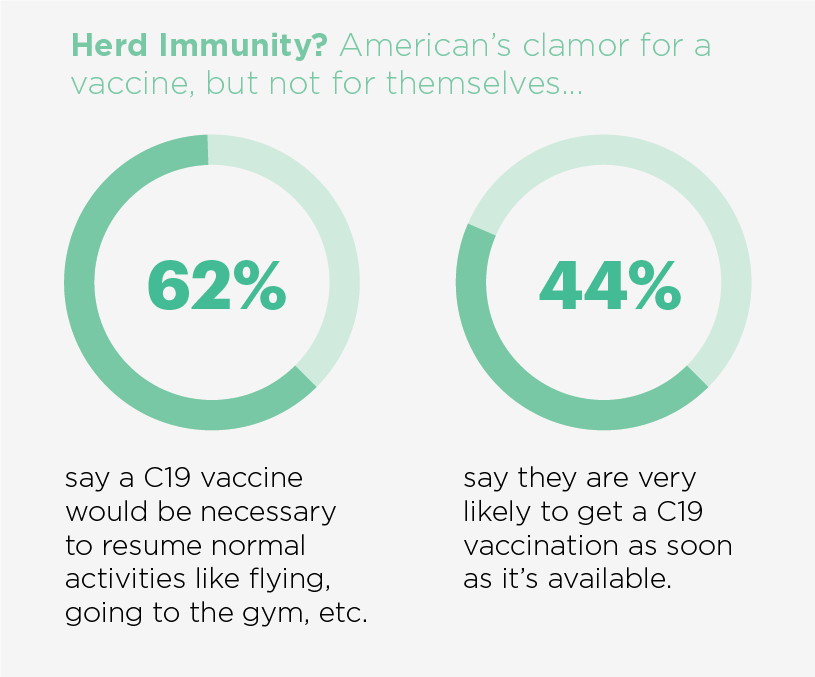 Takeaway: Americans feel the distant future is of no concern, or irrational optimism in our DNA is winning out over common sense. Either way, the good thing is according to our data we’re listening to science and trusting the CDC more than The White House. There’s still time to get that flu shot!
Takeaway: Americans feel the distant future is of no concern, or irrational optimism in our DNA is winning out over common sense. Either way, the good thing is according to our data we’re listening to science and trusting the CDC more than The White House. There’s still time to get that flu shot!
But, What About those Other Heroes?
The spotlight on America’s healthcare workers right now is blindingly bright and blindingly called for. Interestingly, we also see increased empathy (with long-term implications for business) for other essential workers. Harris’ insights on Everyday Heroes calls out the unique struggles of essential workers not on health care’s frontlines, but on the frontlines of grocery stores, delivery services, factories, retail, etc.
- These employees tell us the realities of their workplace simply don’t allow for Cv19 compliance, as many say physical distancing from co-workers (25%) or the public (25%) is not possible given the nature of their work.
- The impacts on family life are dramatic, as 42% of socially distance themselves from family members in their own homes, and 23% are going even further by self-quarantining.
- There is a buzz in breakrooms across the country as a clear majority of essential workers have heard fellow employees request changes for a safer work environment from their employers (61%). Only half (56%) say their company is providing frequent and honest information about infected individuals at work.
Takeaway: There are big implications for HR managers, corporate communicators, and those thinking through safety procedures against these business backdrops. Mid-level managers likely need a new set of skills, and employers and the public alike should empathize with the burden these employees are bearing to keep the nation moving. With a country on edge, 25% of these Everyday Heroes have had a customer say something mean to them recently –so let’s all live by the golden rule when we shop, agree?
Subscribe for more Insights
Subscribe to our newsletter for the latest trends in business, politics, culture, and more.
Download the Data
This survey was fielded online among a nationally representative sample of 2,029 U.S adults from April 18-20, 2020.
Download
Subscribe for more Insights
Subscribe to our newsletter for the latest trends in business, politics, culture, and more.
Download the Data
This survey was fielded online among a nationally representative sample of 2,029 U.S adults from April 18-20, 2020.
DownloadRelated Content







